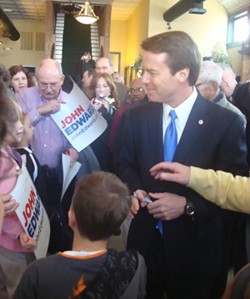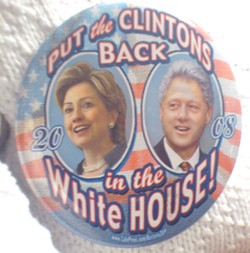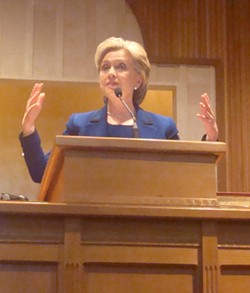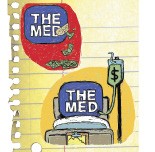It was only a couple of weeks back – a startling fact to
reflect on in this lightning-like season of -breaking primaries and caucuses.
The Republicans of South Carolina, together with some independents in that
open-primary state, had just cast their votes for president, giving Arizona
senator John McCain a narrow victory over former Arkansas governor
Mike Huckabee.
That outcome continued the resurrection of the old
warrior’s candidacy and gave him the opportunity, no matter what happened in the
intervening Florida primary this week, to hold off the persistent and
well-heeled ex-governor of Massachusetts, sometime moderate, sometime
conservative Mitt Romney, and to seal the deal for the GOP presidential
nomination in the 22 states, including Tennessee, that are set to hold primaries
on Tuesday, February 5th.
The next day, January 20th, was a Sunday, and
another presidential aspirant who keenly needed the breath of new life for his
candidacy returned to the state of his birth to begin one of his patented
round-the-clock campaign tours, the kind that few others had the stamina to
pursue.
This was John Edwards, the former senator from North
Carolina and the Democrats’ vice-presidential nominee of four years ago. Edwards
had finished second in the Iowa caucuses, actually edging out the heavy
favorite, Hillary Clinton, there and coming in second behind the surprise
winner and ipso-facto man of destiny, Barack Obama.
 jb
jb
Edwards in South Carolina
Edwards had fallen back to a weak third five days later in
the New Hampshire primary, though, and, given the Blitzkrieg pace of the
2008 primary calendar, it had begun to seem that his hopes for the presidency
and for his unprecedentedly populist platform could now be reckoned in
half-life terms.
Looking around at several score townsfolk who had crowded
into Stephen W.’s Bistro on Main Street in mid-state Newberry, not far from
Edwards’ birthplace in nearby Seneca, sharing space with a sizeable media
contingent and awaiting the candidate’s pending arrival at high noon, it was not
hard to see what his main problem was.
The locals here were all white folks, and while their
presence here gave credibility to the oft-proposed theory that Edwards was the
most saleable Democrat to white Southerners in a general election, the problem
remained that it was not white Southerners who counted most toward a Democratic
nomination in today’s highly diversified party.
Still and all, it was refreshing to listen to a retired
construction executive named Otis Salem give his reasons for favoring Edwards.
“I’m an old man, so I’ve already voted. I voted for him
last Saturday,” said Salem. Why? “He best represents what I think the gospels
teach. He stands for the disadvantaged, and I think that’s exactly what the
gospels say.” What about the Republican evangelic, Huckabee? “I think he misses
the essence of the gospel,” said Salem, explaining,”I’m pro-life in every way
you can imagine. You don’t put guns in the cribs, for example.” But he sighed in
self-recognition. “I’m a rarity.”
Was he worried that Edwards had fallen too far behind to
catch up? “That doesn’t matter. You have to do what you think is right,” Salem
said. And just about then the candidate’s bus arrived, and, after a little
commotion outside, there he was, John Edwards, coming through the glass door in
his Sunday blue suit and shaking hands with the faithful.
He would speak to the crowd with brevity but intensity,
ladling out his populist pledges rapid-fire, almost like a catechism:
New jobs. Health care. Get rid of the carbon-based
economy, get on a green economy. Watched my father go to the mills every day for
36 years. Trade policy that works for this country. Get investment capital into
towns and communities like this.
National broadband policy. A candidate of the people. Stand up for the middle
class. Fighting to end poverty. Glad to meet with y’all on this Sunday
afternoon. Thank you all.
And after handshaking his way out, the same way he came in,
Edwards was gone, ready to do the same thing all over again in dozens of other
South Carolina towns.
It would not avail. South Carolina would see another
third-place finish, 18 percent of the vote behind Obama’s 55 and Clinton’s 27.
AND SO IT WAS THAT EDWARDS ADEPTS like Kate Mauldin,
an officer in the College Democrats and history major at the University of
Memphis, looked into the future and, with the Super Tuesday vote of February 5th
drawing ever nearer, saw her choices changing and narrowing.
She explained her presence at last week’s local
headquarters opening for the Clinton campaign this way: “I came out of the gate
a major John Edwards supporter, and I feel, frankly, it was just be throwing my
vote away to go that way.”
So why Clinton? Mauldin said she, like almost everyone
else, had found Barack “impressive” but, like many others as well, wondered if
the first-term Illinois senator’s campaign for the presidency wasn’t somehow
“presumptuous.”
The clincher, though, was a reading of Senator Obama’s
book, Dreams from My Father, which convinced her that he senator was a
self-absorbed type who would become “another president who would have trouble
admitting mistakes,” and “that’s the last thing we need after George W. Bush.”
Mauldin’s reasoning was idiosyncratic, perhaps, but her
respect for Clinton’s experience and her comfort level with the known quantity
that was Hillary Clinton was not all that far from the thinking of Clinton’s other local
supporters, many of them longstanding activists like the three local members of
the New York senator’s Tennessee steering committee: state party secretary
Gale Jones Carson, Shelby County Commissioner Sidney Chism, and state
Senator Beverly Marrero.
 jb
jb
A button being sported by Clinton backers
Carson and Chism were well-known member of the local
Democratic faction associated with Mayor Willie Herenton, and they were
now working in close harmony with the likes of David Cocke and David
Upton, members of the sometimes bitterly opposed Ford faction.
Clinton, both through her own established persona and as
the spouse of the reigning Democratic eminence, ex-president Bill Clinton,
could definitely connect such dots – one reason why even the wipeout in South
Carolina did not dispel her chances on Super Tuesday and afterwards.
As was well known, the former First Lady still had beaucoup
backup in the way of state organization, as well as a more-than-formidable
campaign war chest. And, as her surprise comeback victory in New Hampshire had
demonstrated, she had something else – a possible reserve of support among women
voters.
Former city council member Carol Chumney spoke to
that aspect of things at a Clinton-campaign press conference on Monday of this
week.
Recalling her own frustrated ambition to become the first
woman mayor of Memphis in the 2007 city elections, Chumney said: “The truth is,
there are some who will support any man over electing a woman as executive,
because the change will affect every single family and the way men and women
relater to each other, both in the workplace and at home.”
Women voters owed it “to our ancestors, but also to the
young girls of this country” to help elect Clinton, Chumney said.
But, even in that moment of steadfast exhortation for
Hillary Clinton, there was an element of uncertainty. Mayor Herenton, so
recently victorious over Chumney in a bitter mayoral fight, had been billed as a
co-endorser at the Monday ceremony, but turned out, for whatever good reason, to
be a no-show.
“Commitments elsewhere,” said former mayoral spokesperson
Carson, who spoke for Herenton and reaffirmed his support for the cause.
Whatever. In any case, the promised joint public pledge to Clinton by 2007’s Odd
Couple did not materialize.
ONE THING THAT CLINTON HAD GOING FOR HER, at least in
Tennessee, was that she had beat rival Obama to the hustings here, making it
clear that she regarded the Volunteer State in the way Tennesseans themselves
like to see it, as a bellwether state.
Even as South Carolinians were giving her a resounding No
on Saturday night in a count that was still proceeding, Senator Clinton was
appearing at a rally at Tennessee State University in Nashville.
There was, to be sure, a certain irony in the affair. There
were two odd things about presidential candidate Hillary Clinton’s appearance at
Tennessee State University in Nashville Saturday night. Early in the event,
Clinton looked into the filled rafters of the school gymnasium and offered a
hearty verbal thank-you to the “students of Tennessee State University” for
welcoming her and being on hand.
The fact was, however, that in the sea of thousands, both
upstairs where she was looking and in the dense seated rows down the floor, the
number of bona fide students at the historically black college – or of African
Americans of any kind — was almost infinitesimal.
Given that this first of two planned Tennessee stops before
Super Tuesday – the other was at Monumental Baptist Church in Memphis on Sunday
— had surely been scheduled to rekindle her (and her husband’s)
long-established standing among African Americans, and that Barack Obama, almost
despite himself, had become a new black icon, the ratio of whites to blacks in
her Nashville crowd — 20-to-one, at minimum – could not be regarded as fully
reassuring to Clinton.
Another odd circumstance was Clinton’s response, late in
her extended Q-and-A session with the crowd in Nashville, to a point-blank
question about the devastating two-to-one trouncing she’d just experienced in
South Carolina.
After a perceptible pause, she began awkwardly: “I was
honored to run in South Carolina… and it was very close….” What came after
that startling denial of reality was a series of stated resolves about keeping
on keeping on, mixed with hopeful platitudes aimed at the larger Democratic
constituency.
One issue is that, unlike her husband, who can famously
glad-hand, orate, small-talk, and bond away with people indefinitely, Senator
Clinton has a tendency to wilt in he course of a prolonged personal appearance,
and, however warm and personal her beginnings, begin to sound mechanical and
repetitious.
She had got to that stage at Tennessee State when she
experienced a brief revival. Asked what her plans might be for husband Bill, she
answered that he might well take on the task of straightening out the country’s
wounded relations with the rest of the world.
Either because the crowd agreed on the appropriateness of
the assignment or because they merely wanted to applaud an explicit mention of
the ex-president, a resounding cheer went up.
That circumstance was a reminder of the growing ambiguity
surrounding the Clinton campaign. Whether fairly or not – and there were good
arguments either way – former President Clinton, and to a lesser extent the
senator herself, had been accused of subtly introducing reminders of Obama’s
race into the campaign.
It was surely wrong to suggest that there was a racial
motive in Bill Clinton’s use of the term “fairy tale” to describe Obama’s claim
to have consistently opposed the Iraq War. But the former president’s pointed
comparison of Obama to Jesse Jackson, who had also won a primary in South
Carolina once, was something else. jb
jb
Hillary in the pulpit at Monumental Baptist
All that was on the back burner for her Sunday appearance
at Monumental Baptist. Speaking from the pulpit, Senator Clinton demonstrated
again a personal touch that rarely comes through via the electronic medium,
though a glimpse of it on TV a day or so before the New Hampshire vote had, by
general consensus, done her much good there.
Clinton regaled the mixed congregation of parishioners and
media with a tale of representing the United States in the ’90s at the
inauguration of Nelson Mandela as president of South Africa, describing how she
kept bouncing from group to group in an effort to avoid, at State Department
request, the indignity of being photographed with the ever-approaching Fidel
Castro.
And she gave her own tribute the honor of Martin Luther
King – though this may have been overshadowed by the powerful oration that
followed from the church’s pastor, the Rev. Billy Kyles, who had been with Dr.
King at the moment of his assassination and, in the presence of the large media
contingent shadowing Clinton, may have felt compelled to render his most
evocative account of that fact ever.
IT REMAINS UNCERTAIN TO WHAT DEGREE Hillary Clinton and
husband Bill still retain the loyalties that for so long had bound America’s
black population to them, though Super Tuesday will undoubtedly provide
something of an answer to that.
 jb
jb
Obama on a stop in Nashville last year.
What is a fact is that the Obama has already begun to
harvest some notable apostates from the Clinton cause. And, already used to
being likened to the figure of John F. Kennedy, the Illinois senator was
publicly embraced and endorsed by three prominent Kennedys this week – daughter
Caroline; nephew Patrick a Rhode Island congressman now; and the reigning
patriarch of the one Democratic family that can compete with and likely outweigh
the Clinton clan, Senator Ted Kennedy.
And whether the Clintons did it through purposeful
mischief, or Obama did it himself through his stepped-up mentions of Dr. King,
beginning in earnest in New Hampshire, or it is a phenomenon that would happened
anyhow, one important simulacrum is now virtually complete. If is the ripening
bond between candidate Obama and black aspirations and between him and a black
electorate that will count for much in the South and in the cities of the rest
of the nation
This is one of the ironies of a campaign year rich in them.
Obama, son of a Kenyan father and a white Kansas mother, had campaigned for
almost a year and entered the primary season without much emphasis on his racial
identity.
That was then, however. This is now, after the opening of
local Obama headquarters in the Eastgate Center two weeks ago drew a crowd that
represented the far corners of Memphis’ African-American community. Clinton
supporters concede privately that the Illinois senator will capture Memphis’
primary vote on a tide of black votes and hope that results in Middle and East
Tennessee can offset them.
Whether or not that happens will be determined on February
5th, as will the likelihood of a protracted struggle that could
continue all the way to late August when the meet in convention in Denver.
Though with the dropout of homestate favorite Fred Thompson
and the perceptible fading of former Arkansas governor Huckabee’s chances, the
Republican drama in Tennessee has been spiked somewhat, even that – a
mano-a-mano now between McCain and Romney – may generate suspense into the
summer.
In any case, Memphis and Tennessee are for once smack dab
in the middle of the decision-making process for a presidential contest that is
still very much up in the air and is:
To Be Continued.
 Greg Cravens
Greg Cravens  jb
jb  jb
jb  jb
jb  jb
jb